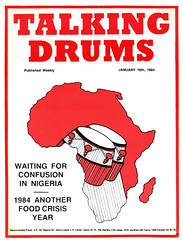What The Papers Say
Paying for economic crimes
National Concord, Nigeria
The pervasiveness of economic crimes profiteering, hoarding, smuggling, currency trafficking and foreign exchange racketeering - and the blind eye, verging on silent complicity, to same by government obviously hastened the demise of the Shagari administration.It is therefore understandable that some soldiers, in a fit of righteous zeal to redress past injustices, marched into some markets some days ago to physically and forcibly kick down the prices of essential commodities.
The drawbacks in this strategy, however, are obvious. Economic crimes are mostly the result of structural difficulties much more fundamental than what obtains in the markets. The markets are merely the manifestations of these problems. Secondly, the real culprits, the big leeches, sharks and other parasites who mastermind the rackets lurk in the background and do not operate in Oshodi, Oyingbo, Onitsha or Kano open markets.
Thirdly, a forcible shooting down of prices momentarily creates a deceptive impression of availability and cheapness only to be quickly followed by total absence of essential goods and the consequent creation of underground markets. Flight-Lieutenant Jerry Rawlings of Ghana witnessed a humbling example of this phenomenon. It is unrealistic to force a trader to sell a tin of milk for 10k (a 600 percent decrease) when it is clear she bought it for 50k or so from distributors as distinct from the manufacturer's price of 18k.
The real culprits are therefore the distributors and all co-operation. The nation must move on. manner of middlemen who should appropriately be at the receiving end of whatever measure the new administration wishes to take to battle artificial scarcities and man-made runaway prices.
Traders may be quite as greedy as distributors. But the injustice which must be quickly corrected, however, is that whereas distributors contribute nothing except their connections with the high and the mighty and the deposit charged in some cases by manufacturers, they are accountable for between 70 and 90 per cent of the abnormal prices charged for goods in our markets.
The distribution system in this country cries for urgent overhaul if not total proscription. It contains an in-built social injustice dictating that the rich grows richer while the poor is down and out. No other group in the country is capable of hoarding goods or escalating the prices of essentials except distributors outfitted, as they always are, with enormous usuriously accumulated capital and strings shiploads of goods and take a trip somewhere to await the disappearance of the meagre stock that managed to slip into the open market.
The cleansing of the Customs and calling to justice of the miscreants among them is imperative as a starting point. Then the Nigerian Security Organisation (NSO) should be deployed to overlook the shoulders of the Customs. We are almost hoarse with calling on the Central Bank to demonstrate a higher degree of patriotism at this time of national economic difficulties. It should set unambiguous guidelines on foreign exchange approvals for commercial banks with regard to the basic travelling allowance and students' fees. Other transactions involving substantial sums should be checked and rechecked with the active collaboration of security agents.
At all events, however, the key to stamping out the various prevalent economic crimes would ultimately depend on governmental firmness and insistence that offenders should be made to pay the price of sabotaging our economic well-being. Such criminals have done far greater damage to the economy than recession and oil glut put together.
Unless the present government takes the initiative to meet them head-on and very quickly too, the momentum would be lost and we would return to square one. No patriotic Nigerian prays for that and we are sure that is not what the government intends.
The task ahead
Daily Times, Nigeria
In a bloodless coup reminiscent of the one that was carried out by late General Murtala Muhammed, the Nigerian Armed Forces, under the leadership of Major-General Muhammadu Buhari, early Saturday morning took over power from Alhaji Shehu Shagari's 91 day second term administration.As the new Head of State had said, the task ahead is challenging and Nigerians should not expect an overnight magic.
The problems are numerous.
In performing their onerous duties to the nation, the new rulers need to be receptive to constructive criticism. However, they must shun praise singing and sycophancy as well as other trappings of power.
It is incumbent on Nigerians to give the new regime full co-operation. The nation must move on.
Nightmarish task
Theirs will be a nightmarish task if they plan (as soon as they promised) to rid Nigeria of corruption and to resuscitate the country's economy. The Standard, KenyaThe challenging task ahead
The Punch, Nigeria
It is not often in the life of a 20th century people to welcome the military in government.Our earlier 13-year-experience of military rule was anything but rewarding. It was more of an excruciating experience.
That the 1979 constitution became unworkable so soon, called into question the wisdom of the military that bequeathed it to our people. Although the coup in itself is an aberration, it is nonetheless a welcome change. For it is a necessary expediency, an abnomality out and out.
Judged by all standards, the civil administration thrusted on us by the courtesy of the then set of military rulers, has been an unmitigated disaster... in this second coming, the new leaders must avoid the pitfalls that have been the undoing of its predecessors. Above all the military should see this second coming as a temporary one designed to accomplish the task of providing the people of Nigeria a workable and democratic form of government. A military government no matter how benevolent is many steps back in the direction of political progress.
